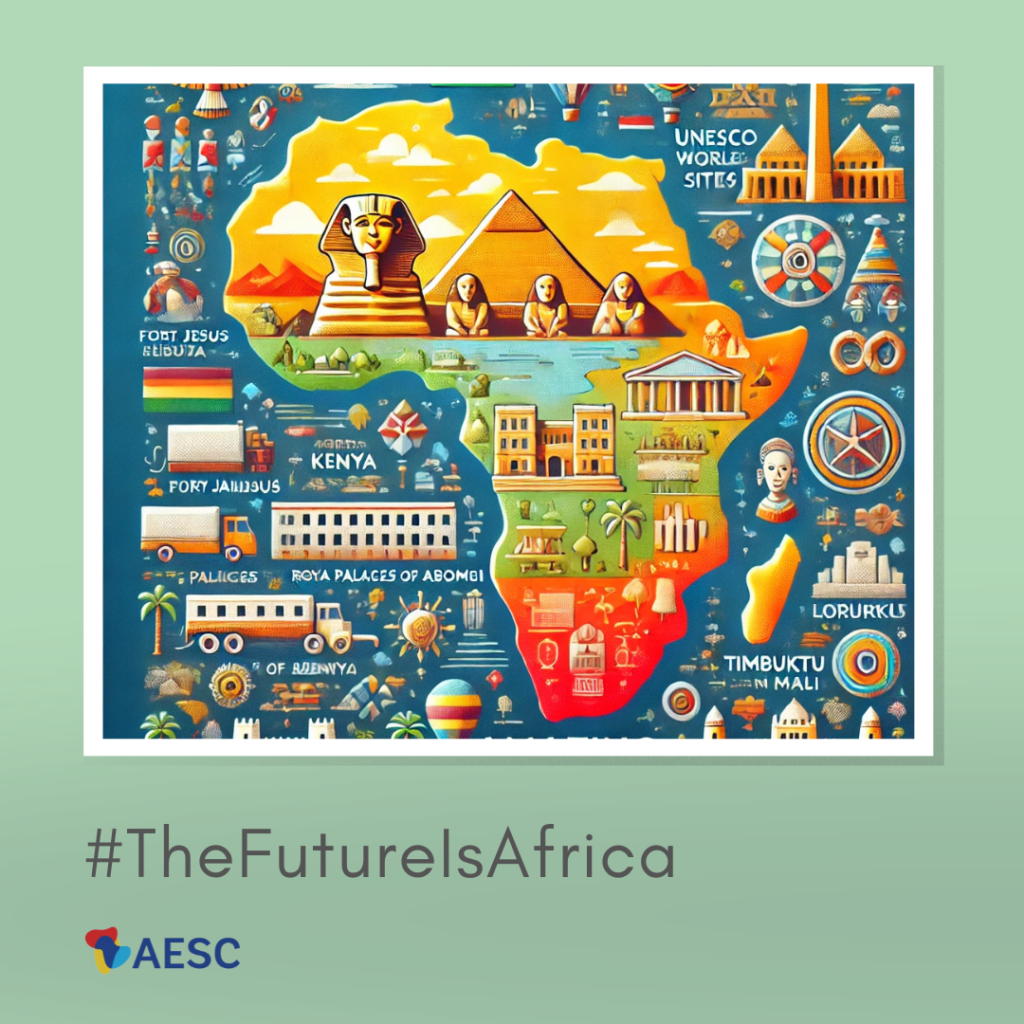
Africa’s Amazing History: A Foundation for the Future
Africa’s rich and diverse history is not only a source of pride for its people but also a testament to the continent’s longstanding contributions to global civilization. The history of the people and civilizations that have, and continue to, populate the African continent encompasses a vast range of achievements, developments, and events that have shaped the world. From the architectural marvels of ancient Egypt to the thriving empires of West Africa, Africa’s history is filled with innovations, trade networks, cultural exchanges, and intellectual advancements that underscore its role as an integral partner in the global community. With 145 UNESCO World Heritage Sites across the continent, Africa’s historical and cultural heritage is a vital part of humanity’s shared legacy, positioning it as a key player in international cultural, economic, and political spheres.
1. Ancient Civilizations: The Roots of Global Knowledge and Culture
Africa is home to some of the world’s oldest civilizations, with achievements that have had a lasting impact on global history. The pyramids of Egypt, one of the most iconic symbols of ancient architecture and ingenuity, are a testament to the advanced engineering, mathematics, and artistry of ancient African societies. The civilization of ancient Egypt, dating back to around 3100 BCE, was a hub of scientific, medical, and architectural innovation that influenced cultures far beyond its borders. The knowledge of astronomy, medicine, and writing systems developed in ancient Egypt laid the foundation for many aspects of modern science and technology.
Beyond Egypt, Africa has been the cradle of other remarkable civilizations. The Kingdom of Kush, located in modern-day Sudan, rivalled Egypt in terms of power and cultural development, with its own pyramids, temples, and distinct art forms. In West Africa, the empires of Ghana, Mali, and Songhai flourished between the 9th and 16th centuries, establishing themselves as major centers of trade, culture, and scholarship. For example, the ancient city of Timbuktu in Mali was a renowned center of learning and commerce, attracting scholars, traders, and travelers from across the Islamic world and beyond. Its libraries housed thousands of manuscripts on subjects ranging from mathematics and astronomy to law and philosophy, highlighting Africa’s historical role as a center of intellectual development.
2. Architectural and Cultural Heritage: Africa’s UNESCO World Heritage Sites
The continent’s 145 UNESCO World Heritage Sites showcase Africa’s extraordinary architectural and cultural diversity. These sites represent a broad spectrum of human history, from ancient civilizations to colonial and post-colonial heritage, demonstrating the continent’s resilience, adaptability, and creativity.
The pyramids of Egypt, perhaps the most famous of Africa’s heritage sites, symbolize the grandeur of ancient architecture and the continuity of civilization over millennia. However, other remarkable sites across Africa highlight the continent’s wide-ranging historical contributions. In Kenya, Fort Jesus in Mombasa is a symbol of the early modern period when the Portuguese established fortresses to control maritime trade routes. This site not only reflects the region’s strategic importance but also the blending of African, Arab, and European influences over centuries.
In Benin, the Royal Palaces of Abomey offer insight into the powerful Dahomey Kingdom, which thrived from the 17th to the 19th century. These palaces, built with intricate bas-reliefs and symbolic designs, illustrate the rich history and complex political systems of pre-colonial African societies. Similarly, the Ruins of Loropéni in Burkina Faso, part of the Lobi culture, are ancient stone enclosures that date back over 1,000 years. They offer a glimpse into the region’s long history of trade networks and social organization, demonstrating Africa’s historical integration into broader global economic systems.
The ancient city of Timbuktu, another UNESCO World Heritage site, stands as a monument to Africa’s intellectual and spiritual heritage. As a centre for Islamic scholarship in the 15th and 16th centuries, Timbuktu attracted scholars from across the world, making it a melting pot of ideas and knowledge. The city’s historic mosques and libraries still bear witness to Africa’s rich intellectual legacy and its contributions to global knowledge.
3. African Kingdoms and Empires: Pillars of Economic and Cultural Influence
Africa’s history is marked by the rise and fall of powerful kingdoms and empires that controlled vast territories and influenced regional and international trade routes. The Ghana Empire, which dominated West Africa between the 9th and 13th centuries, was known for its wealth generated through the gold and salt trade. It established trading networks that connected West Africa with North Africa and the Mediterranean, contributing to a flourishing economy and cultural exchange.
Following the Ghana Empire, the Mali Empire rose to prominence in the 13th century. Under the leadership of Mansa Musa, often regarded as one of the wealthiest individuals in history, the Mali Empire expanded its influence over much of West Africa. Mansa Musa’s famous pilgrimage to Mecca in 1324 not only demonstrated the wealth of his empire but also facilitated cultural and economic ties between West Africa and the Islamic world. The Mali Empire’s contributions to culture and scholarship, particularly in cities like Timbuktu, have had a lasting impact on Africa’s history.
In East Africa, the Swahili Coast was a bustling centre of commerce, connecting African traders with those from the Arabian Peninsula, Persia, India, and China. Coastal cities like Kilwa and Zanzibar became hubs for the exchange of goods such as gold, ivory, and spices, as well as ideas and cultures. This rich history of trade and cultural interaction demonstrates Africa’s longstanding role in global economic systems and highlights the importance of recognizing the continent’s contributions to world history.
4. The Legacy of Colonialism and Post-Colonial Resilience
Africa’s history also includes the complex legacies of colonialism, which reshaped political, social, and economic structures across the continent. From the 19th century onward, European powers carved Africa into colonies, exploiting its resources and people. This period had a profound impact, leading to struggles for independence in the mid-20th century. The stories of African leaders such as Kwame Nkrumah in Ghana, Patrice Lumumba in the Democratic Republic of Congo, and Nelson Mandela in South Africa illustrate the continent’s fight for freedom, dignity, and self-determination.
The post-colonial period has been marked by both challenges and triumphs as African nations worked to build new identities, economies, and political systems. The resilience and innovation of African societies in the face of colonial legacies and global challenges continue to shape Africa’s future, making it an essential partner in global development and diplomacy. The rebuilding of nations and the emphasis on preserving Africa’s cultural heritage through the restoration of UNESCO sites are key elements of this ongoing journey.
5. Why Africa’s History Matters for the Future
Africa’s incredible history is more than a record of the past; it is a foundation for future growth and global partnership. The continent’s rich heritage, encompassing advanced civilizations, thriving trade networks, and dynamic cultural exchanges, underscores Africa’s long-standing role in global development. This historical depth provides African nations with the cultural and intellectual capital needed to navigate contemporary challenges and opportunities.
Furthermore, Africa’s wealth of UNESCO World Heritage Sites offers not only cultural and historical value but also economic potential through tourism and heritage preservation. Initiatives to preserve and promote these sites are not only about honouring the past but also about building sustainable industries that create jobs and promote cultural exchange. By investing in its heritage, Africa strengthens its identity, fosters unity, and positions itself as a global destination for cultural tourism.
Conclusion
Africa’s amazing history, marked by its incredible civilizations, architectural wonders, and enduring cultural legacies, makes it an indispensable partner in the global community. From the pyramids of Egypt to the intellectual centers of Timbuktu, Africa’s historical achievements highlight its role as a center of human development, trade, and innovation. As the continent continues to grow and develop, its history will remain a source of inspiration and strength.



